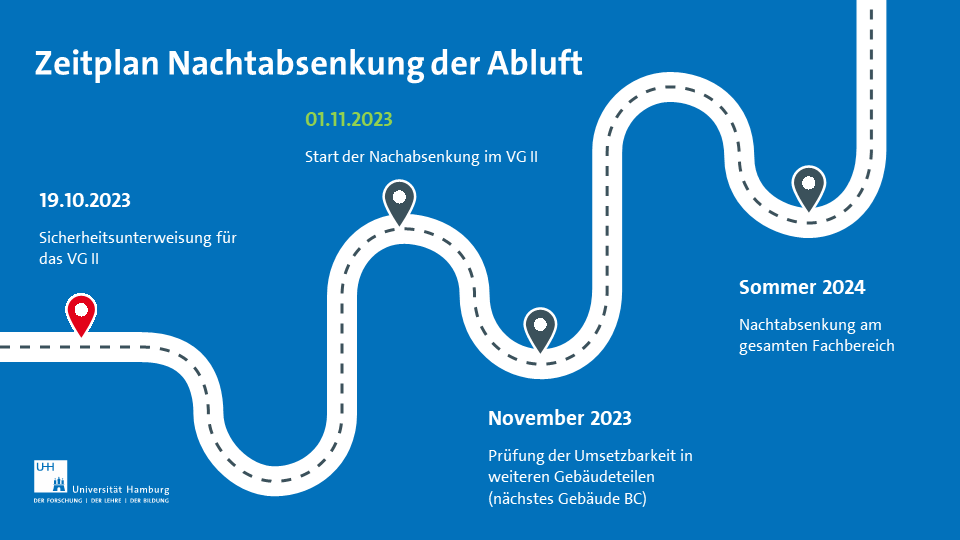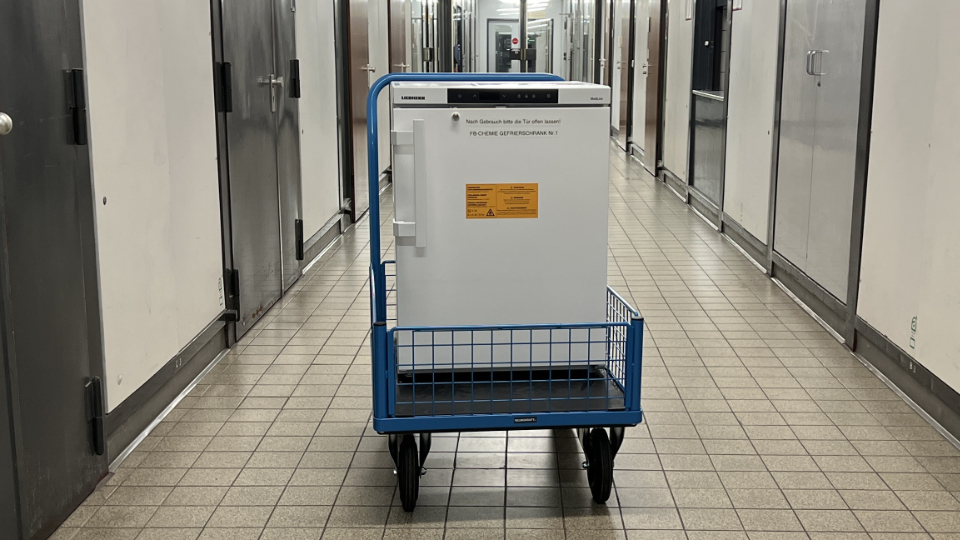Projects at the department
The sustainability team has called for suggestions on sustainability as part of an innovation competition. The aim was to raise awareness of environmentally friendly behaviour in the department and contribute to the development of sustainable solutions. Regardless of whether this involved technological innovations, organisational approaches or educational initiatives. This has also resulted in many projects.
We are currently focusing on the following:
Night-time lowering
Since 1 November 2023, the pilot project to lower the fume hoods in the House of Molecules (VG II) at night has been running with the aim of saving energy. The night-time reduction was decided at the department's closed meeting in April this year and has now been implemented.
In practical terms, this means that between 9 p.m. and 5 a.m. on Mondays to Fridays and all day at weekends and on public holidays, the draw-off rate will be reduced by 30%. It is expected that the reduction will result in approximate electricity savings of 20% compared to ‘normal operation’. In addition, reducing the air exchange rate will also save thermal energy, as smaller quantities of air that are fed into the building will need to be heated.
In addition to saving energy, the night-time reduction also has an impact on occupational safety. Full chemical work is not possible during these times. However, the fume cupboards can be manually switched back to ‘normal operation’ if required. In all laboratories, instructions for lowering and operating instructions for manually raising the fume cupboard output have been installed by the building services and occupational safety departments. A safety briefing on this was held for all VG II employees on 19 October.
Facility management is currently examining how the night-time reduction of the extraction rate can also be implemented in other parts of the building. The next building to be tackled is the biochemistry department. The aim is to implement a comprehensive night-time reduction in the entire faculty next summer.

A big thank you goes to the facility management and occupational safety departments for realising this project.
Digitalisation/E-exams
Many lecturers in the department have their exams written on paper at the end of the semester. Since the exams have to be printed some time in advance, but students can still register and, above all, deregister in STiNE 3 days before the exam, only 35 of the 80 printed exams are ultimately needed, the rest end up in the shredder. The use of e-exams would completely eliminate the use of paper!
The prerequisites for e-exams at the Department of Chemistry are all in place (e.g. 100 iPads on loan from the MIN e-learning office, LMS systems such as OpenOLAT or Moodle) and are already being used successfully by many colleagues, but unfortunately not yet by everyone. One hurdle is probably a certain rejection of LMS systems in general and e-exams in particular. Of course, designing an e-exam requires more work than copying existing exam tasks. On the other hand, a well-designed e-exam can also be used in subsequent semesters without any problems and the correction time is also faster, as the correction is partially automatic.
This could be remedied by establishing an office in the department to support the implementation of e-exams. Be it didactic support (electronic question formats such as single choice, multiple choice, drag & drop, matrix tasks, hot spot, cloze text, etc. can have many pitfalls) or technical support, both would certainly be useful, would introduce colleagues to e-exams, make teaching more innovative and, above all, reduce the consumption of paper and toner. I would be happy to provide advice on e-exams.
(Patrick Ziegelmüller)
Roof greening
As a result of the ideas competition on sustainability and the proposal by Nils Wax from the Prof. Fischer working group, the faculty is currently examining various roof areas for possible greening. The roofs on the institutes are generally ruled out as the ventilation technology leaves hardly any open space and the statics are not given. After all, the roof must be able to support the retained water as well as the ground. The possible moisture damage caused by leaks reduces the areas to ‘new’ roofs, which also cannot be used in competition with PV systems. There are basically two possible areas here:
- The roof areas in the entrance area of Organic Chemistry: the two small roofs had already been greened before the roofing felt was replaced two years ago, but unfortunately the roofs were not subsequently greened. The building services department is currently investigating whether the areas can be restored to their previous state.
- The roof of the shipping department: Greenery was planned for the roof when the new building was designed. This was then cancelled due to cost pressure. A review of the construction documents revealed that the structural design of the roof was still designed for a green roof at a later date. The application is currently being prepared.
Campus greening
There are still some open areas on the Chemistry Campus that are neither visually nor ecologically attractive. These areas are to be redesigned by the activities group „Gärtnern am MLKP“ in cooperation with the "AG Campusbegrünung". Plans are to be developed for the greening of the individual areas and insect-friendly planting based on permaculture gardens will be planted there.
There is also the idea of setting up raised beds with integrated seating, as already designed by the "AG Campusbegrünung".
Mobile freezers for temporary storage when defrosting freezers in the research group
Eine dicke Eisschicht in Gefriertruhen sorgt für einen größeren Stromverbrauch von bis zu 50 Prozent. Je nach Vereisung sollten diese daher ein bis zwei Mal im Jahr abgetaut werden. Auf Vorschlag des Nachhaltigkeitsteams im AK Beck hat der Fachbereich zwei mobile Tiefkühltruhen angeschafft, in denen beim Abtauen von Tiefkühltruhen in den Arbeitskreisen die Chemikalien zwischengelagert werden können.
Die Kühltruhen können in der Warenannahme Chemie I (derzeit telefonisch/per Mail) hierfür reserviert und dann ausgeliehen werden. Die Verfügbarkeit der Kühltruhen werden wir demnächst mit einem Buchungssystem regeln, derzeit muss man bei der Warenannahme nachfragen.
A thick layer of ice in freezers increases electricity consumption by up to 50 per cent. Depending on how icy they are, they should therefore be defrosted once or twice a year. At the suggestion of the sustainability team in the Beck working group, the department has purchased two mobile freezers in which the chemicals can be temporarily stored when defrosting freezers in the working groups.
The freezers can be reserved for this purpose in the Chemistry I "Warenannahme" (currently by telephone/email) and then borrowed. We will soon regulate the availability of the freezers with a booking system; at the moment you have to ask at the "Warenannahme".

Mental health
One aspect of the 17 SDGs is goal number three: ‘Good health and well-being’. Mental health is a growing problem in our society, which is also very pronounced in the academic environment. Despite increasing destigmatisation and public discourse, it is still difficult to admit to being affected and to seek help. Students in particular suffer from mental illness more frequently than employees of the same age.
The university has a psychological counselling centre with a wide range of services. These are available to students who seek specific information and contact the counselling centre. There are several barriers at this point: Those affected must independently come to the conclusion that they have a problem that they need help with and they must take the step of researching and contacting the counselling service.
However, the centre also offers workshops aimed at preventing mental health problems. According to the TK Health Report 2023, preventative programmes are the ones most frequently requested by the students surveyed. The statement that more such services are desired indicates that they are not (or cannot be) received by students to the extent required.
In order to counteract this, the topic should be dealt with more prominently at the faculty and contact points should be set up to which students and employees can turn in acute situations. These centres should be located at student level as well as among the academic, technical and administrative staff.
This should lower the inhibition threshold for initial contact and make the services more present. The aim is to improve awareness and education on mental health issues so that problems can be recognised earlier and the appropriate preventative measures can be introduced.
Resource-optimised methods in the research groups
The RG Beck submitted a list of suggestions for the ideas competition in order to minimise the use of resources in the department and make the department more sustainable. To this end, a brainstorming session was held in the group seminar to consider where concrete contributions to greater sustainability could be made. This resulted in suggestions for organisational approaches and concrete examples for day-to-day research. On the one hand, the suggestions relate to the work areas of the working groups, where the majority of energy and resources are certainly consumed. Ideas for the entire department are also listed.
One of the suggestions is to regularly discuss the switching off of unused devices in the working groups with all employees in the working group. Another suggestion relates to energy-efficient cooling of research samples. The purchase of mobile “travelling freezers” was suggested here. In the meantime, two freezers have been ordered and will soon be available to borrow centrally from the department so that the interim storage of refrigerated goods is guaranteed while the department's own equipment is defrosted.
Disposable items play an important role in everyday research. In order to reduce the generation of waste, the recommendation is to review the syntheses and laboratory protocols to see whether disposable items (e.g. plastic syringes) can be replaced by reusable items (e.g. made of glass).
To minimise paper consumption, another idea is to rely more on digital laboratory protocols. On the one hand, this concerns the submission of student protocols, which use a lot of paper. Submission and correction as a PDF have proven to be practicable. Secondly, handwritten lab notebooks should be replaced by electronic lab notebooks (ELNs). AK Beck is already using an electronic solution for documentation. This saves paper and at the same time prepares the department for the future through digitalisation.
